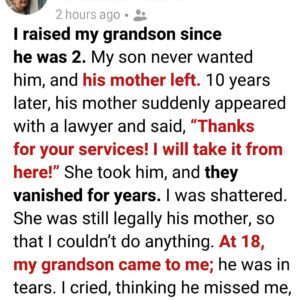A few years ago, I met a man and fell deeply in love. For a while, everything felt right — thoughtful conversations, shared laughter, plans that made the future seem steady and close. The only thing that occasionally unsettled me was his limited availability. Certain evenings or weekends, he simply couldn’t come over. I assumed he had other responsibilities, maybe work or family obligations, and chose to trust rather than question.
Then, not long ago, the truth came crashing in. He wasn’t single — he was married, with a wife of ten years and three children. I didn’t find out from him, but from her. She called me directly, confronting me about the affair. The conversation was painful, and by the end of it, we both walked away wounded — two women trying to make sense of the same deception from different sides.
Afterward, he came to me in tears. He begged me to stay, promising to leave his wife, insisting that what we shared was real. But something inside me had changed. I kept thinking: if he could betray her, what would stop him from betraying me the same way?
For weeks, our exchanges circled around his pleading and my refusal. Then, two weeks ago, he told me he had filed for divorce. His words stirred confusion — a mix of guilt, longing, and disbelief. I wanted to believe him, but I no longer knew what was true.
And then, last week, I found out I was pregnant.
Shortly after, his wife called again, this time asking to meet. I hesitated, but something in her tone made me agree. We sat across from each other in a quiet café — two strangers tied by one man’s choices.
Her words were steady, not bitter. She warned me not to trust him, describing how he had deceived her with the same tenderness he once used on me. But then she said something unexpected: she wanted her children to meet my baby when the time came. “They share blood,” she said softly. “And one day, they’ll want to know.”
Her composure unsettled me — not because she was wrong, but because she spoke from a place I hadn’t yet reached: acceptance.
Now I find myself facing questions that have no easy answers.
What kind of relationship, if any, should I maintain with the father? Should I open the door for his children to know their sibling? Can something born out of pain still become a source of healing and belonging?
I don’t know yet. But I do know this: my first responsibility is to protect my child’s peace. That means no rushed decisions, no emotional bargaining, no promises made out of guilt or fear. I will listen carefully, take counsel, and move slowly — guided not by the chaos of what has happened, but by what will build a safe and truthful future.
Some bonds are chosen; others arrive uninvited. This one — fragile, complicated, and new — will require grace, patience, and clear boundaries. But perhaps, in time, even this painful beginning can give rise to something gentler: a new kind of family, shaped not by deceit, but by honesty, forgiveness, and the quiet work of rebuilding trust.





